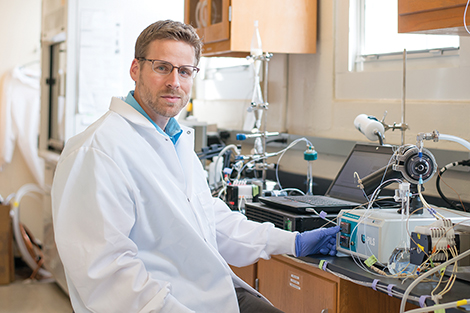Christopher Hennigan, an UMBC expert on air quality, health, and climate change was recently featured in UMBC magazine:
Everyone dreads a bad air day when it pops up on a weather forecast, but knowing how those conditions are created is essential to finding ways to ameliorate or prevent the damage to health and climate.
Christopher Hennigan, assistant professor of chemical, biochemical, and environmental engineering, is at the forefront of analyzing these issues. His work focuses on pollutants known as particulate matter or aerosols—small particles in the air that have detrimental effects on human health and important implications for climate change.
This work has come to the attention of the National Science Foundation (NSF), which gave Hennigan a CAREER award of $524,606 to characterize the effects of acid-catalyzed reactions on the atmospheric transformation of volatile organic compounds into secondary organic aerosol (SOA).
SOA is an ubiquitous component in the atmosphere that contributes to aerosol effects on human health and climate, but there has been disagreement between laboratory studies and ambient readings on the role of particle acidity in its formation. So Hennigan and his team are developing new methods to rapidly measure particle acidity through automated system that provides the best combination of high time resolution and accuracy.
When Hennigan’s new technique is deployed, it will provide more accurate models representing SOA formation, thus improving scientists’ ability to make predictions related to ambient aerosol events.
“The five-year duration of the CAREER award is especially advantageous, as it will allow us to push the work forward in a highly significant way,” says Hennigan.
–Dinah Winnick
